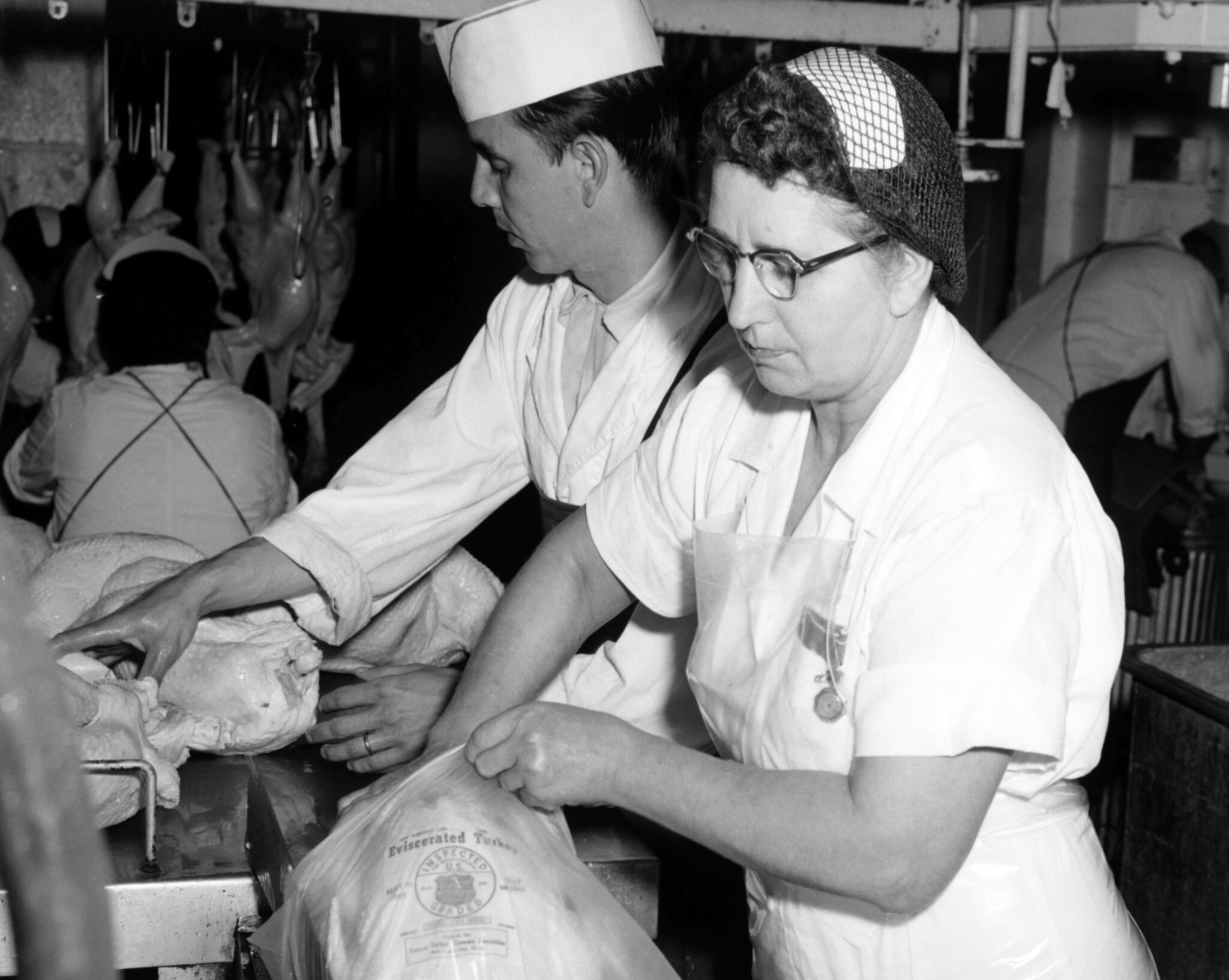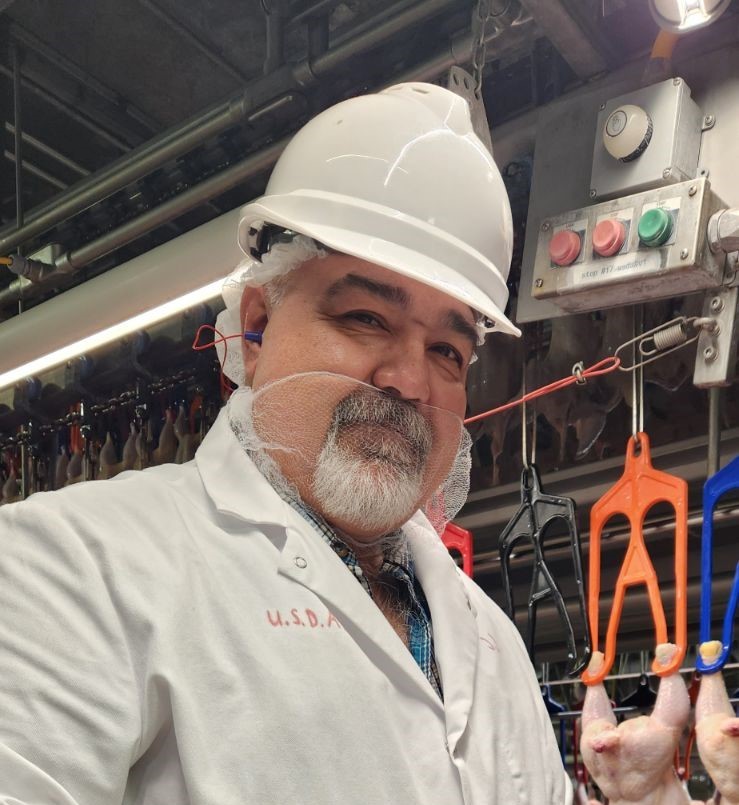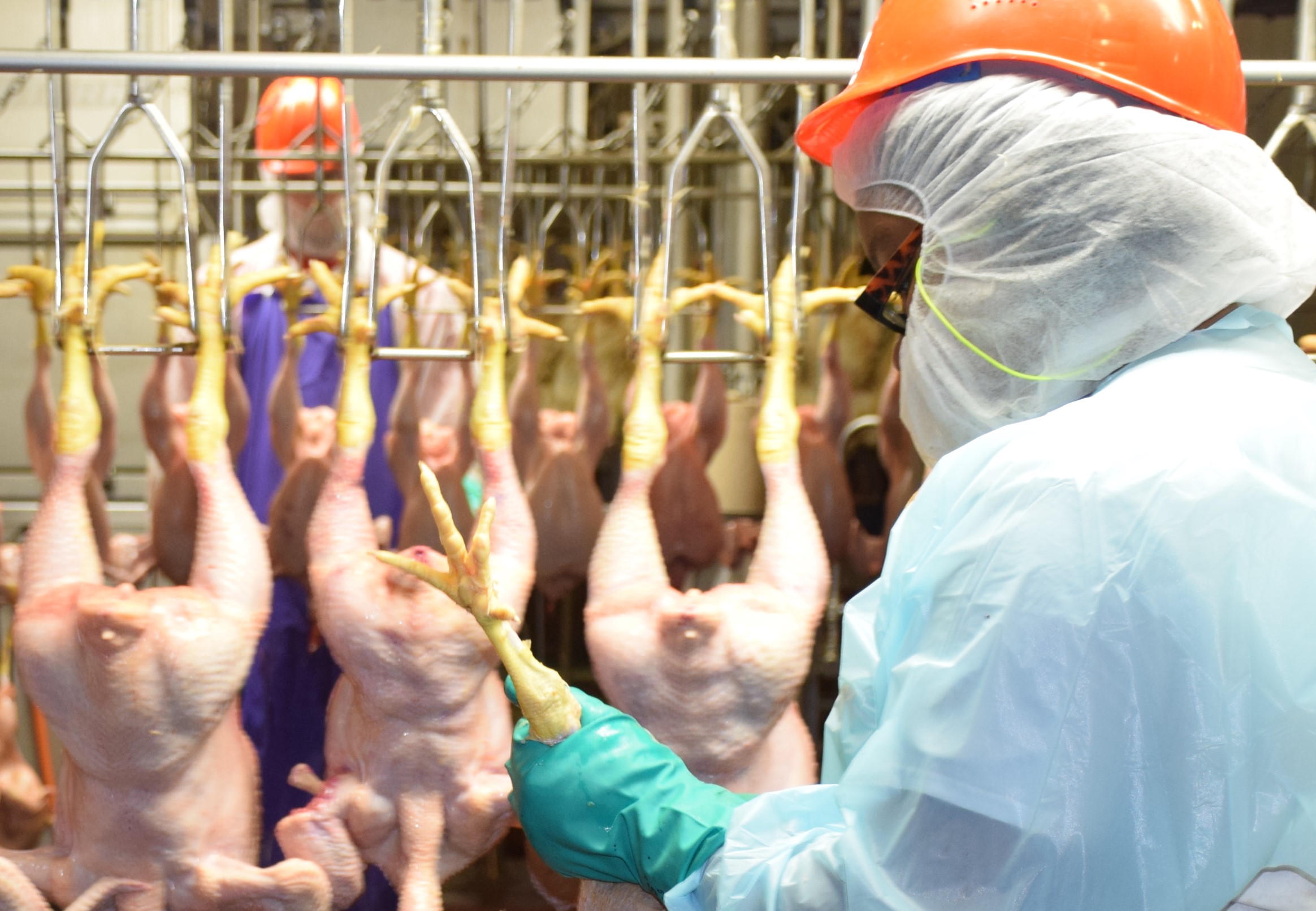
November 2021 Snapshots
“Essential Worker” Coins Presented to Madison, Wisc., Circuit Team Members
By Felicia Thompson, OPACE
During the third quarter of Fiscal Year 2021, Administrator Paul Kiecker and Deputy Administrator Terri Nintemann commissioned “Essential Worker” recognition coins, also called “pandemic coins,” to thank FSIS employees for their service early in the COVID-19 pandemic. The citation that came with the coins (see below) noted that employees “contributed tremendously to FSIS’ ability to fulfill federal inspection duties and ensure that no FSIS-regulated establishment closed due to a lack of inspection personnel.” The efforts of these dedicated public servants at the worksite allowed consumers to have access to safe meat, poultry and egg products.
The Agency awarded 7,432 coins in all. In general, supervisors presented the coins directly to their team members. Frontline Supervisor (FLS) Dr. Catherine Pierce, a 14-year FSIS employee in the Des Moines District, personally delivered pandemic coins to recipients on her team in the Madison, Wisconsin, circuit.
“I traveled to various locations to meet with my staff and present their coins. Inspection can be a very difficult and demanding job. I wanted to convey how much each person means to our circuit and to the Agency,” Pierce said. "It seemed a small thing to sacrifice, the time and energy it took to hand-deliver these recognition coins, spend a few minutes with them, find out how they are doing, and to let them know that they are appreciated by the Agency and their work is important.”
She remarked that her team never complained about how hard it was to get their work done. “They continued to go to work when there was so much confusion about the pandemic and how to stay safe. To me, all of this speaks volumes regarding my team’s dedication.”
Many of the recipients from the Madison circuit are pictured here with their coins. The numbers on the photos correspond to the team members and the sentiments they shared.

- Pictured, from left: Consumer Safety Inspectors (CSI) Dan Bries, FLS Dr. Pierce and CSI Rich Rink. Rink said, “The pandemic coin represents a trying time where the people I work with and I succeeded in the face of adversity.”
- CSI Ntyce Hiro. “I’m honored to have received the pandemic coin, and I’m happy to have been able to do my job during the pandemic.”
- Pictured, from left: FLS Dr. Pierce and CSI Linda Worley.
- Enforcement, Investigations, and Analysis Officer John Cottier. “What [inspectors] do is important to protect the public. The Agency and public expect us to go out every day and do our jobs, and we get it done!”
- CSI Christian Acevedo.
- The Essential Worker recognition coin is brass, weighs 1-1/3 ounces, and designed by the FSIS Office of Public Affairs and Consumer Education.
- CSI Jenna King.
- CSI Colby Brock. “FSIS is my career home. The recognition coin is a very cool keepsake that I’ll show my son when he is older. My immediate and frontline supervisor have been very supportive and understanding during the pandemic; the coin is just the cherry on top.”
- CSI Jim Harrison.
- CSI Erik Saxer.
- CSI Mickey Sanborn. “The pandemic coin shows how we came together and supported each other through long hours during such a trying and stressful time. The coin makes me feel proud. I have always been proud to be a part of the Agency and being recognized with the coin for work during a pandemic is such a great feeling.”
- CSI Steven Lee. “Receiving the coin is a lasting symbol that, even during a pandemic, as a team we can all achieve more and are making a difference.”
- (Retired) SPHV Dr. Joe Schurhammer.
- CSI Erik Malvesti. “The coin is a neat memento to remind me of an interesting period in my career.”
- CSI Don Bebee.
- CSI Matthew Peyton. “My job gives me the opportunity to make sure that loved ones and the general public receive wholesome, safe and properly labeled product.”
- CSI Derek Wallenhorst.

Madison, Wisc.

On Nov. 4, the Des Moines District Office, in conjunction with the University of Wisconsin-Madison and Ecolab, provided a learning opportunity at the Wisconsin Food Safety Summit. The summit educates, allows for the exchange of information, and opens lines of communication between different segments of industry, public health officials and regulatory agencies.
FSIS provided updates and discussed a variety of topics, including: the significance of microbiological sampling in meat and poultry establishments; microbiological sampling, methods, sample work-up and interpreting results; sampling procedure demonstrations; sanitation basics; and approaches to developing and implementing effective pre-operational and operational sanitation.
Participants had an opportunity to bring up questions or concerns to FSIS employees and request clarification on FSIS issuances.
Pictured, from left: Office of Field Operations (OFO) Assistant Administrator Dr. Philip Bronstein; Office of Policy and Program Development Senior Food Technologist Dr. Meryl Silverman; University of Wisconsin-Madison Lab Manager Cindy Austin; University of Wisconsin-Madison Associate Professor/Extension Meat Specialist Jeff Sindelar; OFO Enforcement Investigation and Analysis Officers Dana Ewald and Tiffiny Pierce. Not pictured is Ecolab Account Manager Jan Murray. Photo by Outreach Specialist University of Wisconsin-Madison Jesse Brookstein.
Waco, Texas

On Oct. 28 Administrator Paul Kiecker (pictured, right) talks with Food Inspector Richard Grant as Grant works the final rail at a beef slaughter and processing establishment. Photo by Robert Witte, OA.
Waco, Texas

On Oct. 28, Administrator Paul Kiecker (pictured, left) met with Frontline Supervisor Dr. Carrie Teetz and Supervisory Public Health Veterinarian Dr. Mbarouk Shariff. Among other things, the trio spoke about their very different career paths. Dr. Teetz has lived and worked in the area most of her life, while Dr. Shariff has moved back-and-forth between New England and Texas over his FSIS career. Photo by Robert Witte, OA.
Fort Worth, Texas

On Oct. 29, Administrator Paul Kiecker (pictured, back row, center) visited with inspection personnel at two establishments separated by a road. One establishment slaughters and processes beef and the other slaughters and processes feral swine, where inspection program personnel (IPP) were wearing face shields before COVID to mitigate the risk of Brucellosis from feral swine.
During the visit, the team and the Administrator discussed methods for addressing loud working conditions, and opportunities to lateral into other positions to obtain a better work/life balance. Kiecker also thanked IPP for their great work.
Picture, front row, from left: Food Inspectors Nancy Rangel and Debral Lewis and Supervisory Public Health Veterinarian Dr. Alfredo Santiago. Pictured, back row, from left: Frontline Supervisor Dr. Kenneth Clevenger, District Manager Dr. Jennifer Beasley-McKean, Administrator Kiecker, and Consumer Safety Inspector Prudencio Camacho. Photo by Robert Witte, OA.
San Antonio, Texas

On Oct. 27, Administrator Paul Kiecker (pictured, standing, center) and Deputy Chief of Staff Robert Witte (pictured, seated, left) attended a work unit meeting for the San Antonio, Texas, circuit. The group discussed ways they successfully de-escalate conflict in tense situations with establishment management, vaccine requirements, supervisory responsibilities related to vaccines and training in advanced processing.
Pictured, seated, from left: Deputy Chief of Staff Witte and Consumer Safety Inspector (CSI) Teresa Arriesgado. Pictured, standing, from left: CSIs Juan Moreno, Fred Espronceda and Javier Ramos, Kiecker, Supervisory Public Health Veterinarian (SPHV) Dr. Craig Bookout, CSI Pedro Tijerina, Frontline Supervisor Marcus Patranella, SPHV Dr. Marissa Martinez, CSI Ricky Richards and SPHV Dr. Joe Kitzman. Photo by a USDA employee.
San Antonio, Texas

On Oct. 27, Administrator Paul Kiecker spoke to industry personnel at a food safety, inspection affairs and scientific affairs event. Kiecker thanked industry for their efforts in following the Centers for Disease Control and Prevention’s guidance on masking, providing safer working conditions for inspection program personnel. He also talked about regulatory updates, issuances that should be publishing soon, and options available to industry impacted by the recent port congestion and supply chain issues. Photo by Robert Witte, OA.
Forest, Miss.
The first shift gathered on Oct. 26 to celebrate the upcoming holidays and to show love and appreciation for their colleague and breast cancer survivor, Consumer Safety Inspector (CSI) Phyllis Lampkin (pictured, seated, center).

Pictured, seated, from left: CSIs Regnaldo Washington, Lampkin and Dorothy Hurst.
Pictured, standing, from left: CSIs Deionne Gilbert, Betty Bobbitt, Briggett Hughes, Cliff Statum and Lakesha Sturkey, Supervisory Public Health Veterinarian Dr. Britney Washington and CSI Cindy Crudup. Photo courtesy of Christina Walker, OFO.
Zephyr, Texas

Administrator Paul Kiecker (pictured, left) and Deputy Chief of Staff Robert Witte (pictured, center) met with plant management and inspection personnel.
During the Oct. 28 visit, the establishment owner explained the challenges and benefits of starting a new business in a rural setting and was appreciative of the outreach provided by local inspection personnel.
While meeting with Consumer Safety Inspector Dory Seales (pictured, right), the vaccine requirement was discussed.
Pictured, from left: Kiecker, Frontline Supervisor Dr. Carrie A. Teetz, Witte, Est. 47742 President Mike Crawford and Seales. Photo by a plant employee.



